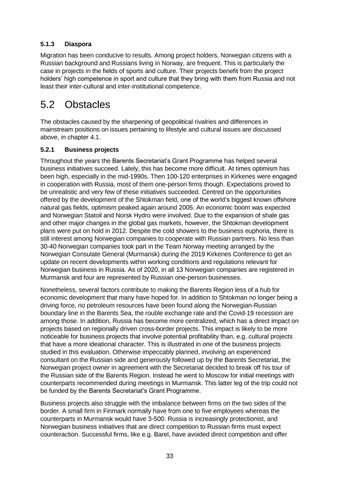5.1.3
Diaspora
Migration has been conducive to results. Among project holders, Norwegian citizens with a Russian background and Russians living in Norway, are frequent. This is particularly the case in projects in the fields of sports and culture. Their projects benefit from the project holders’ high competence in sport and culture that they bring with them from Russia and not least their inter-cultural and inter-institutional competence.
5.2 Obstacles The obstacles caused by the sharpening of geopolitical rivalries and differences in mainstream positions on issues pertaining to lifestyle and cultural issues are discussed above, in chapter 4.1. 5.2.1
Business projects
Throughout the years the Barents Secretariat’s Grant Programme has helped several business initiatives succeed. Lately, this has become more difficult. At times optimism has been high, especially in the mid-1990s. Then 100-120 enterprises in Kirkenes were engaged in cooperation with Russia, most of them one-person firms though. Expectations proved to be unrealistic and very few of these initiatives succeeded. Centred on the opportunities offered by the development of the Shtokman field, one of the world’s biggest known offshore natural gas fields, optimism peaked again around 2005. An economic boom was expected and Norwegian Statoil and Norsk Hydro were involved. Due to the expansion of shale gas and other major changes in the global gas markets, however, the Shtokman development plans were put on hold in 2012. Despite the cold showers to the business euphoria, there is still interest among Norwegian companies to cooperate with Russian partners. No less than 30-40 Norwegian companies took part in the Team Norway meeting arranged by the Norwegian Consulate General (Murmansk) during the 2019 Kirkenes Conference to get an update on recent developments within working conditions and regulations relevant for Norwegian business in Russia. As of 2020, in all 13 Norwegian companies are registered in Murmansk and four are represented by Russian one-person businesses. Nonetheless, several factors contribute to making the Barents Region less of a hub for economic development that many have hoped for. In addition to Shtokman no longer being a driving force, no petroleum resources have been found along the Norwegian-Russian boundary line in the Barents Sea, the rouble exchange rate and the Covid-19 recession are among those. In addition, Russia has become more centralized, which has a direct impact on projects based on regionally driven cross-border projects. This impact is likely to be more noticeable for business projects that involve potential profitability than, e.g. cultural projects that have a more ideational character. This is illustrated in one of the business projects studied in this evaluation. Otherwise impeccably planned, involving an experienced consultant on the Russian side and generously followed up by the Barents Secretariat, the Norwegian project owner in agreement with the Secretariat decided to break off his tour of the Russian side of the Barents Region. Instead he went to Moscow for initial meetings with counterparts recommended during meetings in Murmansk. This latter leg of the trip could not be funded by the Barents Secretariat’s Grant Programme. Business projects also struggle with the imbalance between firms on the two sides of the border. A small firm in Finmark normally have from one to five employees whereas the counterparts in Murmansk would have 3-500. Russia is increasingly protectionist, and Norwegian business initiatives that are direct competition to Russian firms must expect counteraction. Successful firms, like e.g. Barel, have avoided direct competition and offer 33


